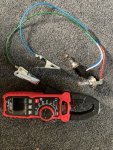doug748
Well-known member
I suspect my house battery is losing capacity. Has anyone used one of these (available under different brand names Silverline, Sealy etc):
Clarke CVT2 12V Battery Tester - Machine Mart - Machine Mart
The reviews look ok, anyone used one on the boat? I would like to avoid lugging the battery for a test and it's nice to have an impartial idea of the state of things.
Clarke CVT2 12V Battery Tester - Machine Mart - Machine Mart
The reviews look ok, anyone used one on the boat? I would like to avoid lugging the battery for a test and it's nice to have an impartial idea of the state of things.



